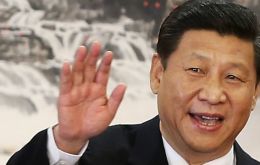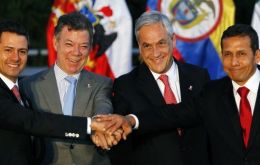MercoPress. South Atlantic News Agency
Economy
-
Monday, September 9th 2013 - 01:36 UTC
Mercedes plans to build a compact cars factory in Brazil

German carmaker Daimler plans to build a new Mercedes factory in Brazil to benefit from growing demand for compact cars in the country, its chief executive told a German newspaper.
-
Sunday, September 8th 2013 - 00:38 UTC
Argentina before the NY appeals court hoping ‘vulture’ funds litigation extends into 2014/15

Argentina filed two appeals before the New York Appeals Court over the dispute with the so called ‘vulture (hedge) funds’. The presentation was made a few moments before the Friday deadline and in the petition Argentina requests the revision of the 23 August ruling which orders Argentina to make effective the full payment of 1.4bn dollars (full face value of defaulted sovereign bonds plus interests) to the claimants.
-
Sunday, September 8th 2013 - 00:13 UTC
China’s 2014 growth target remains at 7%; this year could reach 7.5%

China’s government may cut the country’s annual growth target to 7% next year, although the actual pace of expansion will be higher, said Fan Jianping, chief economist at a state research institute. The drop would be in line with the goal set in the country’s 2011-2015 five-year plan for annual average expansion of 7%.
-
Saturday, September 7th 2013 - 17:19 UTC
Olympics return to Japan despite Fukushima; in final vote Tokyo defeated Istanbul

Tokyo was awarded the 2020 Olympics on Saturday, capitalizing on its reputation as a “safe pair of hands” and defying concerns about the Fukushima nuclear crisis. Tokyo defeated Istanbul 60-36 in the final round of secret voting Saturday by the International Olympic Committee. Madrid was eliminated earlier after an initial tie with Istanbul.
-
Saturday, September 7th 2013 - 02:13 UTC
Final presentation from three PMs to decide what city will host 2020 Olympics

From the Fukushima nuclear leak to the war in Syria to Europe's economic crisis, the choice of the host city for the 2020 Olympics is fraught with risks. Picking the site with the least risks shapes up as the challenge for the International Olympic Committee on Saturday in a tight three-city contest that members say is too close to call.
-
Friday, September 6th 2013 - 02:06 UTC
Pacific Alliance again shows its trade growth muscle in 2012

The Alliance of the Pacific, Chile, Peru, Colombia and Mexico, has again given evidence of its potential in Latinamerica: total exports in 2012 reached 556 billion dollars and imports 551 billion, which means the four countries consolidated concentrate 50% of the continent’s foreign trade.
-
Friday, September 6th 2013 - 02:00 UTC
Mujica confirms: no intention of irritating Argentina on pulp mills’ controversy

Uruguay’ President Jose Mujica said the decision authorizing a possible expansion, or not, of the UPM/Botnia pulp mill is closely linked to Argentina and the construction of a third plant along an inside Uruguayan river and not a shared one as is the case now.
-
Friday, September 6th 2013 - 01:52 UTC
Repsol expands gas production in Bolivia to supply growing Argentine demand

Spain’s Repsol inaugurated on Thursday, a month before schedule, a new module of its gas processing plant in Margarita in the south of Bolivia which will allow the company in three weeks, to significantly increase its production and delivery to Argentina, its main client.
-
Friday, September 6th 2013 - 01:42 UTC
Debt-struck Madrid believes its modest budget will end hosting the 2020 Olympics

Debt-struck Madrid is betting its penny-pinching bid to host the Olympics in 2020 will reap rich economic dividends for recession-hit Spain. The Spanish capital is banking on a low-cost 5 billion dollars Olympic bid that relies heavily on existing stadiums to surprise Tokyo and Istanbul when Olympic chiefs make their decision in Buenos Aires on Saturday.
-
Friday, September 6th 2013 - 01:17 UTC
Cristina Fernandez meets WTO chief and blasts world powers ‘protectionism’

With a busy agenda prior to her G20 Summit address, Argentine President Cristina Fernández renewed her criticism of so called world powers’ “protectionism” and warned about a “crisis of the multilateral system” both in the economic and political arenas.
